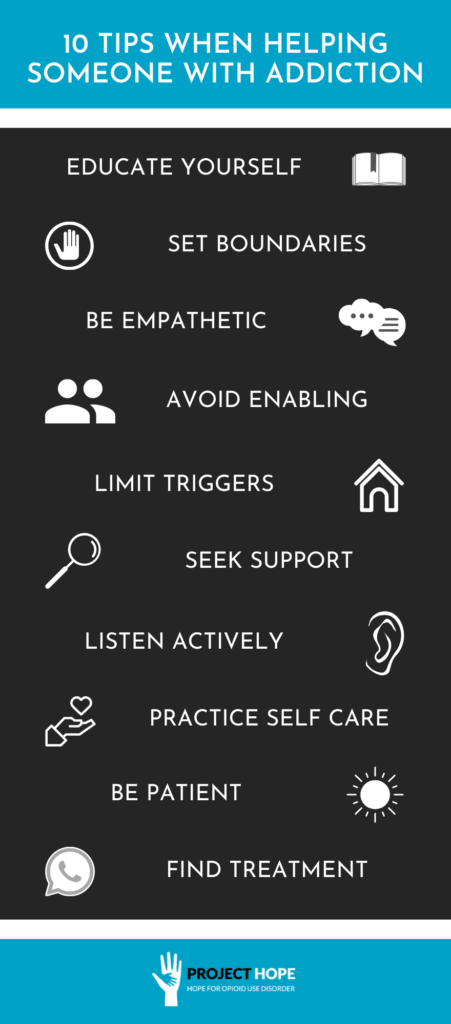
 Substance use disorder is one of the most stigmatized health conditions worldwide, impacting people far beyond the addicted person. Living with addiction can elicit feelings of isolation, guilt, embarrassment, and shame for addicts and their family members. While support plays a major role in recovery, loved ones may find themselves dealing with mental health problems, physical issues, and financial difficulties during this process.
Substance use disorder is one of the most stigmatized health conditions worldwide, impacting people far beyond the addicted person. Living with addiction can elicit feelings of isolation, guilt, embarrassment, and shame for addicts and their family members. While support plays a major role in recovery, loved ones may find themselves dealing with mental health problems, physical issues, and financial difficulties during this process.
If your loved one is struggling with addiction, please look at the following tips and contact Project Hope at (707) 387-1631.
1 – Educate Yourself
Learning the risk factors, signs and symptoms, and what to expect is a great first step in helping someone with an addiction. Start with reputable sources such as:
- Center for Disease Control and Prevention (CDC)
- Substance Abuse and Mental Health Services Administration (SAMHSA)
- National Institute on Drug Abuse (NIDA).
2 – Set Boundaries
Boundaries such as “no drugs or alcohol in the house” helps to set clear limits on what is and is not acceptable. These expectations help protect their home, finances, and relationships.
3 – Be Empathetic
Show that you care through your behavior such as:
- Acting with kindness and compassion where they may expect rejection and criticism
- Accepting the person as they are even if you do not endorse their behavior
- Being consistent with your message, expectations, and boundaries.
4 – Avoid Enabling
When caring for an addict, consider moments where another loved one has enabled them. Enabling could look like:
- Loaning them money to fund their addiction
- Making excuses to family members or friends to save them embarrassment
- Lying to others to keep them out of trouble
This state of protecting the family member from the consequences of their addiction prevents them from experiencing the actual cost of their addiction.
5 – Limit Triggers
Helping a loved one manage environmental triggers such as people or places, exposure triggers, and stress triggers can decrease relapse rates. In addition, working together with a dedicated professional on how to limit these triggers facilitates long-term recovery.
6 – Seek Support
Connect with others in a safe, non-judgmental environment where you and your loved ones can learn, discuss, and cope. Individual, group, and family therapy, as well as peer support groups, can benefit those who are feeling stress and isolated from caring for a loved one with addiction problems.
7 – Listen Actively
Addiction happens for several reasons, including other mental health disorders. If a person with addiction confides in you, listen without interrupting or criticizing, provide the space for them to tell their story, and try to understand where they are coming from.
8 – Practice Self Care
Take care of yourself first. Addiction can affect your mental, physical, and emotional well-being even if you are not the one using drugs or alcohol. Self-care can look different for everyone; however, some approaches include:
- Asking for help
- Eating healthy
- Exercising
- Developing routines
- Setting boundaries
- Exploring new ways to relax
9 – Be Patient
It is important to remember that addiction is a chronic disease, and relapse is a normal part of recovery. The addicted person and their loved ones may be frustrated by the process and timeline; however, recovery is more accessible with managing expectations and actively supporting one another.
10 – Find Treatment
Talk to a professional about the best ways to encourage sobriety and help your loved one seek help by researching local treatment options available such as our Medication-Assisted Treatment (MAT) Program.

